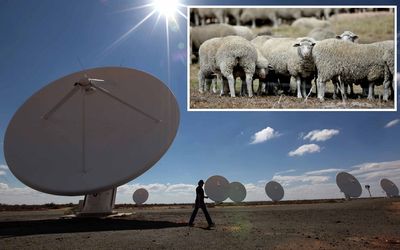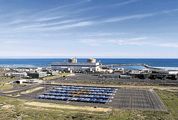TENSIONS are rising between Karoo sheep farmers and the Square Kilometre Array (SKA) SA project, over its plans to buy 118,000ha of land to protect the telescope from interference.
This week, it emerged most of the affected farmers are unwilling to even allow the project’s appraiser access to their farms to assess the value of the properties, a development that appears to have caught the SKA SA team on the back foot.
"We knew the negotiations would be blood, sweat and tears, but we didn’t anticipate resistance at the valuation stage," said Alice Pienaar-Marais, SKA SA land-acquisition programme manager.
The SKA is an international science project located in SA and Australia, and will be the world’s most powerful radio telescope once completed. After the design of the first phase of the telescope was completed last year, scientists mapped out the size and shape of the land required to protect it from radio frequency interference.
About 131,500ha (1,315km²) of land surrounding the telescope’s 176-dish core, which lies 80km from Carnarvon, needs to be free from radio frequency interference. In 2008, the project acquired 13,500ha (135km²) of this land with the purchase of Losberg and Meys Dam farms.
The area in question consists of 36 parcels of land held by 22 individuals. Compensation will also have to be paid to other landowners who are required to grant access rights to small parcels of land, or servitudes, that will hold 21 dishes in three 90km arms spiralling out from the telescope’s core.
Last year the SKA SA office held public meetings to spell out the process for acquiring the land it now needs.
Ultimately the landowners have no choice but to sell, as the land will be expropriated if negotiations fail, but the SKA SA office has previously said it sees this as an absolute last resort.
The first step was to be for the SKA SA’s appointed valuer to assess the value of the farmers’ properties, but to date, few of them have agreed to this.
One of the biggest sticking points appears to be the fact that most of the farmers want to negotiate collectively through the Kareeberg Farmer’s Forum, which represents about 80% of the affected landowners, according to Charl de Witt, a member of the forum.
Ms Pienaar-Marais said the SKA SA project could not legally negotiate with the forum, unless it has written mandates do so from those it claims to represent, which have not been forthcoming.
Farmers are also unhappy about confidentiality clauses contained in the documents they must sign when the valuation process gets under way, said Mr de Witt, who owns land on which the SKA requires a servitude.
Ms Pienaar-Marais said the farmers’s position posed no real threat to the project, as "ample time" had been provided for negotiations. The deadline for the land-acquisition process is December next year.
If farmers continued to dig in their heels, a valuation would be determined using publicly available information, she said.
Ms Pienaar-Marais declined to specify how many farmers had agreed to allow the SKA appraiser to start work, saying farmers willing to engage with the project were under enormous pressure from their peers not to do so.
"We are committed to paying market-related prices. We are willing to pay what they (the properties) are worth, but we also have a responsibility with respect to taxpayers’s money and must account back to the Treasury," she said.

BLOCK: The KAT-7 telescope, a precursor to the much larger MeerKAT Karoo telescope and SKA, which has run into opposition over its plan to acquire land, used for sheep farming (Inset). Pictures: SUNDAY TIMES
TENSIONS are rising between Karoo sheep farmers and the Square Kilometre Array (SKA) SA project, over its plans to buy 118,000ha of land to protect the telescope from interference.
This week, it emerged most of the affected farmers are unwilling to even allow the project’s appraiser access to their farms to assess the value of the properties, a development that appears to have caught the SKA SA team on the back foot.
"We knew the negotiations would be blood, sweat and tears, but we didn’t anticipate resistance at the valuation stage," said Alice Pienaar-Marais, SKA SA land-acquisition programme manager.
The SKA is an international science project located in SA and Australia, and will be the world’s most powerful radio telescope once completed. After the design of the first phase of the telescope was completed last year, scientists mapped out the size and shape of the land required to protect it from radio frequency interference.
About 131,500ha (1,315km²) of land surrounding the telescope’s 176-dish core, which lies 80km from Carnarvon, needs to be free from radio frequency interference. In 2008, the project acquired 13,500ha (135km²) of this land with the purchase of Losberg and Meys Dam farms.
The area in question consists of 36 parcels of land held by 22 individuals. Compensation will also have to be paid to other landowners who are required to grant access rights to small parcels of land, or servitudes, that will hold 21 dishes in three 90km arms spiralling out from the telescope’s core.
Last year the SKA SA office held public meetings to spell out the process for acquiring the land it now needs.
Ultimately the landowners have no choice but to sell, as the land will be expropriated if negotiations fail, but the SKA SA office has previously said it sees this as an absolute last resort.
The first step was to be for the SKA SA’s appointed valuer to assess the value of the farmers’ properties, but to date, few of them have agreed to this.
One of the biggest sticking points appears to be the fact that most of the farmers want to negotiate collectively through the Kareeberg Farmer’s Forum, which represents about 80% of the affected landowners, according to Charl de Witt, a member of the forum.
Ms Pienaar-Marais said the SKA SA project could not legally negotiate with the forum, unless it has written mandates do so from those it claims to represent, which have not been forthcoming.
Farmers are also unhappy about confidentiality clauses contained in the documents they must sign when the valuation process gets under way, said Mr de Witt, who owns land on which the SKA requires a servitude.
Ms Pienaar-Marais said the farmers’s position posed no real threat to the project, as "ample time" had been provided for negotiations. The deadline for the land-acquisition process is December next year.
If farmers continued to dig in their heels, a valuation would be determined using publicly available information, she said.
Ms Pienaar-Marais declined to specify how many farmers had agreed to allow the SKA appraiser to start work, saying farmers willing to engage with the project were under enormous pressure from their peers not to do so.
"We are committed to paying market-related prices. We are willing to pay what they (the properties) are worth, but we also have a responsibility with respect to taxpayers’s money and must account back to the Treasury," she said.




















Change: -0.42%
Change: -0.35%
Change: -0.17%
Change: 0.14%
Change: -2.58%
Data supplied by Profile Data
Change: -0.56%
Change: 0.13%
Change: -0.42%
Change: 0.00%
Change: -0.18%
Data supplied by Profile Data
Change: 0.20%
Change: 0.04%
Change: 0.10%
Change: -0.07%
Change: 0.12%
Data supplied by Profile Data
Change: -0.01%
Change: 0.42%
Change: 0.00%
Change: -0.53%
Change: 0.59%
Data supplied by Profile Data